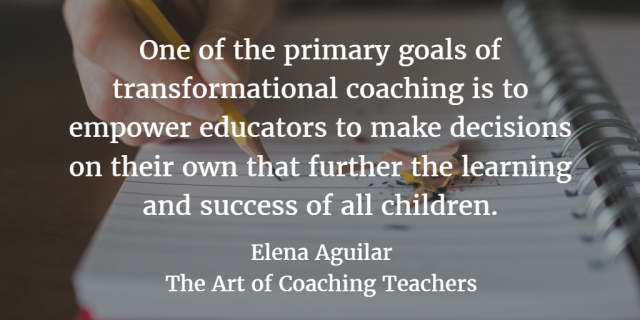Rapid, constant, and disruptive change is now the norm, and what succeeded in the past is no longer a guide to what will succeed in the future. Twenty-first-century managers simply don’t (and can’t!) have all the right answers. To cope with this new reality, companies are moving away from traditional command-and-control practices and toward something very different: a model in which managers give support and guidance rather than instructions, and employees learn how to adapt to constantly changing environments in ways that unleash fresh energy, innovation, and commitment.
The role of the manager, in short, is becoming that of a coach.
The above quote is from a recent Harvard Business Review article entitled The Leader as Coach. This article resonated with me, as there has also been a “dramatic and fundamental shift” in what is required of leaders in schools. Increasingly, an effective school leader – just like an effective manager – “asks questions instead of providing answers, supports employees instead of judging them, and facilitates their development instead of dictating what has to be done.”
I wholeheartedly agree with the HBR article that coaching is not easy and does not always come naturally, but it IS a skill that can be learned. Since last December, I have been so fortunate that my school sent me and a colleague to both Cognitive Coaching Foundation and Advanced Cognitive Coaching through Thinking Collaborative. This professional learning has transformed my ability to mediate my own thinking and better support the thinking of teachers and collaborative teams that I support. In Cognitive Coaching: Developing Self-Directed Leaders and Learners, Arthur L. Costa and Robert J. Garmston state that “cognitive coaching is about producing self-directed learners and leaders with the disposition for continuous, lifelong learning” and is a “nonjudgemental, developmental, reflective model.” (p1)
To be very honest, I was quite skeptical before attending this training. I had the impression that Cognitive Coaching was very robotic or scripted; I thought that perhaps it would not fit my personality. However, the workshops have given me flexible tools and strategies to support my coaching practice. While my instructional coaching role requires me to be a collaborator or consultant at times, I truly believe that instructional coaches and school leaders should embrace a growth mindset and prioritize building capacity and supporting reflective practice in others. A coaching mindset should be the preferred way of supporting others.
So many aspects of the Cognitive Coaching workshops were helpful. The ‘roadmaps’ for planning, reflecting, problem-resolving, and calibration conversations help me to more productively navigate conversations with others. Unproductive ways of listening and other coaching ‘set-asides’ are incredibly important. However, one of the most powerful aspects of this course for me was learning about the five states of mind: consciousness, craftsmanship, efficacy, flexibility, and interdependence. Understanding that in any situation, a person can be high or low in each of these states of mind was a real ‘lightbulb moment’ for me. It led to my awareness that my questioning can be much more intentional in order to better support others’ thinking. In fact, understanding the five states of mind also helps me to develop a greater awareness of my own perceptions and assumptions.
Another aspect of the HBR article that resonated with me is the need for school leaders and instructional coaches to not only coach others, but to be coached themselves. On numerous occasions, I have experienced the power of having a colleague coach me when I need to clarify my thinking or get some perspective. Having someone ask me a question that challenges my thinking while simultaneously helping me to make sense of something is very up-lifting. ALL teachers and leaders DESERVE a coach. After all, “coaching done well may be the most effective intervention designed for human performance.” (Atul Gawande in The New Yorker article Personal Best)

